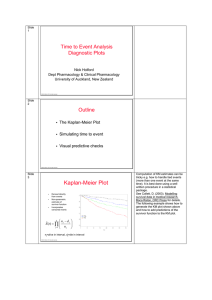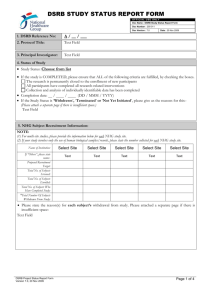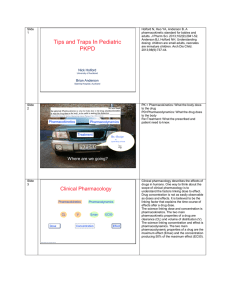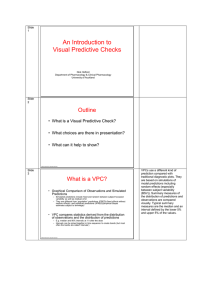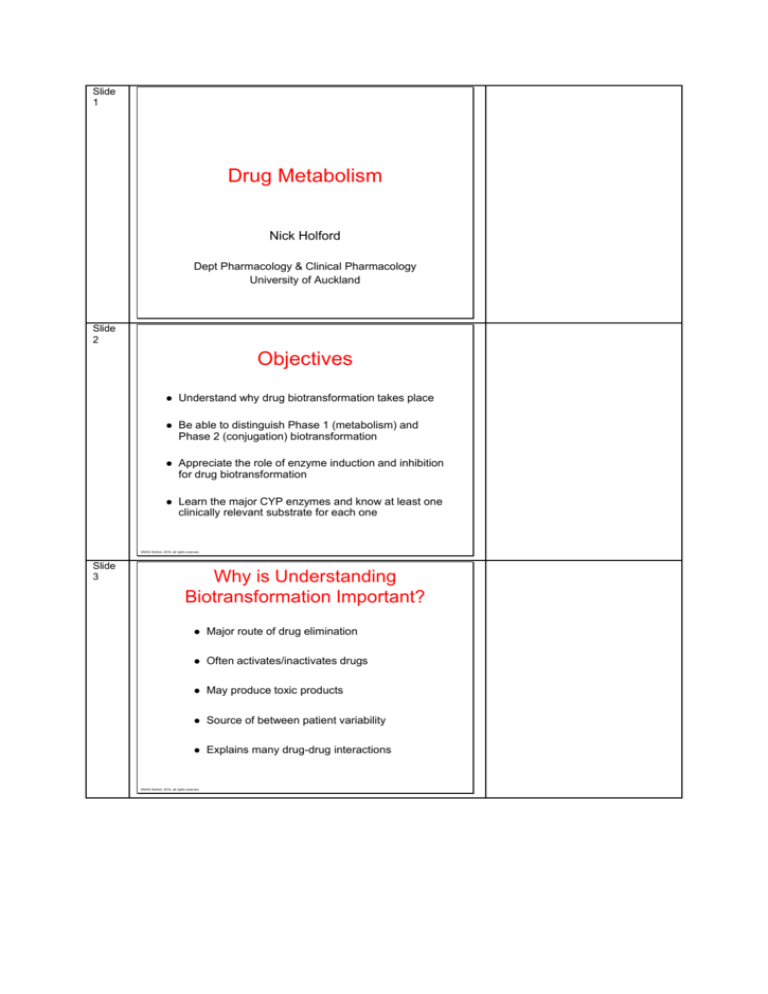
Slide
1
Drug Metabolism
Nick Holford
Dept Pharmacology & Clinical Pharmacology
University of Auckland
Slide
2
Objectives
Understand why drug biotransformation takes place
Be able to distinguish Phase 1 (metabolism) and
Phase 2 (conjugation) biotransformation
Appreciate the role of enzyme induction and inhibition
for drug biotransformation
Learn the major CYP enzymes and know at least one
clinically relevant substrate for each one
©NHG Holford, 2016, all rights reserved.
Slide
3
Why is Understanding
Biotransformation Important?
Major route of drug elimination
Often activates/inactivates drugs
May produce toxic products
Source of between patient variability
Explains many drug-drug interactions
©NHG Holford, 2016, all rights reserved.
Slide
4
Biotransformations
Two main phases
PHASE 1
DRUG
(RH)
PHASE 2
INT
(ROH)
R-O-R’
PHASE 2 – CONJUGATION (SUGARS, SO4, Acetyl………. )
R-O-R’ – USUALLY EXCRETED IN URINE
2007, all rights reserved.
©NHG Holford, 2016,
Slide
5
http://en.wikipedia.org/wiki/Cytochrome
_P450
Major Enzyme Systems
Phase 1
» Cytochrome P450 (CYP)
Phase 2
» Transferases
– Glucuronyl– Sulphate– Acetate-
©NHG Holford, 2016, all rights reserved.
Slide
6
Cytochrome P450
Synonyms
» CYP
» Mixed function oxidase (MFO)
» Microsomal P450
Actions
» Over 70% of drugs are metabolized by CYPs
Location
» Gut wall
» Liver
©NHG Holford, 2016, all rights reserved.
Slide
7
CytochromeP450
©NHG Holford, 2016, all rights reserved.
Slide
8
HemeContaining Iron
©NHG Holford, 2016, all rights reserved.
Slide
9
CYP Substrates
P450 Family
Substrates
CYP 1,2,3
Medicines
CYP 4,5,8
Fatty acids,
prostaglandins
Steroids
CYP 7,11,17,21,24,27
©NHG Holford, 2016, all rights reserved.
Slide
10
CYP1A2
Marker Drug
theophylline
Clinically Relevant Drugs
» bronchodilator (theophylline)
Drug Interaction
» tobacco, green veges, BBQ (inducer)
» cimetidine (inhibitor)
Ethnicity
»?
©NHG Holford, 2016, all rights reserved.
Slide
11
CYP2E1
Marker Drug
ethanol
Clinically Relevant Drugs
» analgesic paracetamol (-> NAPQI)
Drug Interaction
» ethanol (inducer)
Ethnicity
»?
©NHG Holford, 2016, all rights reserved.
Slide
12
CYP2C9
Marker Drug
s-warfarin
Clinically Relevant Drugs
» anticoagulant (warfarin)
Adverse Event Risk
» Lower dose and increased bleeding risk
Ethnicity
» Caucasian
25%
» Asian
1%
(% with variant alleles and lower CL)
©NHG Holford, 2016, all rights reserved.
“CYP2C9 variants with reduced
metabolizing ability were less frequent
in Japanese compared to the other two
populations. ” Takahashi H, Wilkinson
GR, Nutescu EA, Morita T, Ritchie MD,
Scordo MG, Pengo V, Barban M,
Padrini R, Ieiri I, Otsubo K, Kashima T,
Kimura S, Kijima S, Echizen H.
Different contributions of
polymorphisms in VKORC1 and
CYP2C9 to intra- and inter-population
differences in maintenance dose of
warfarin in Japanese, Caucasians and
African-Americans. Pharmacogenet
Genomics 2006; 16: 101-10. Available
at http://tiny.cc/zkbeyw
Japanese Caucasian
CYP2C9
*2 C430T 0.000 0.133
*3 A1075C 0.035 0.056
Total
3.5% 18.9%
http://tiny.cc/qmbeyw
Slide
13
CYP2C19
Marker Drug
s-mephenytoin
Clinically Relevant Drugs
» acid-pump inhibitor (omeprazole)
Therapeutic Benefit
» Cure of GORD 86% in poor metabolizers, 46% in homozygous
extensive metabolizers of lansoprazole
Drug Interaction
» Decreased effectiveness of clopidogrel (a prodrug),an anti-platelet
agent, when combined with omeprazole (CYP2C19 inhibitor)
Ethnicity (% with low clearance)
» Caucasian
» Asian
©NHG Holford, 2016, all rights reserved.
4%
20%
GORD=Gastro Oesophageal Reflux Disease
Slide
14
[11/17/2009]
FDA is alerting the public to new safety
information concerning an interaction
between clopidogrel (Plavix), an anticlotting medication, and omeprazole
(Prilosec/Prilosec OTC), a proton pump
inhibitor (PPI) used to reduce stomach
acid. New data show that when
clopidogrel and omeprazole are taken
together, the effectiveness of
clopidogrel is reduced.
Clopidogrel is metabolized to its active
metabolite in part by CYP2C19.
Concomitant use of drugs that inhibit
the activity of this enzyme results in
reduced plasma concentrations of the
active metabolite of clopidogrel and a
reduction in platelet inhibition. Avoid
concomitant use of drugs that inhibit
CYP2C19, including omeprazole
(Prilosec), esomeprazole, cimetidine,
fluconazole, ketoconazole,
voriconazole, etravirine, felbamate,
fluoxetine, fluvoxamine, and ticlopidine
http://tiny.cc/0obeyw
CYP2D6
Marker Drug
debrisoquine
Clinically Relevant Drugs
» tricyclic-antidepressants (amitriptyline)
» beta-blockers (metoprolol)
» prodrug analgesics (tramadol, codeine)
Drug Interaction
» fluoxetine, quinidine (inhibitor)
Ethnicity (% with low clearance)
» Caucasian
» Asian
7%
1%
©NHG Holford, 2016, all rights reserved.
Slide
15
CYP3A4
Marker Drug
simvastatin
Clinically Relevant Drugs
» HMG-CoA reductase inhibitor (simvastatin)
» protease inhibitor (anti-HIV) (lopinavir)
» immunosuppressant (cyclosporine)
Drug Interaction
» ketoconazole, grapefruit juice (inhibitor)
» lopinavir with ritonavir for improved effect
» St John’s Wort (inducer)
Ethnicity
No recognized polymorphism
» ?
©NHG Holford, 2016, all rights reserved.
30% of medicines are metabolized to
with CYP3A4/5 as the major pathway
Zanger UM, Schwab M. Cytochrome
P450 enzymes in drug metabolism:
Regulation of gene expression, enzyme
activities, and impact of genetic
variation. Pharmacology &
Therapeutics. 2013;138(1):103-41.
Slide
16
CYP Activity
Induction
» Increased activity
» Many substances can induce
– E.g. tobacco smoke induces CYP1A2
Inhibition
» Decreased activity
» Usually competitive
– E.g. grapefruit juice inhibits CYP3A4 (in gut)
©NHG Holford, 2016, all rights reserved.
Slide
17
Clinical Applications
Drug Interaction Awareness
Dose Individualization
» Needs
– Phenotype
Target Concentration Intervention
or
– Genotype
©NHG Holford, 2016, all rights reserved.
Not widely available (yet)

